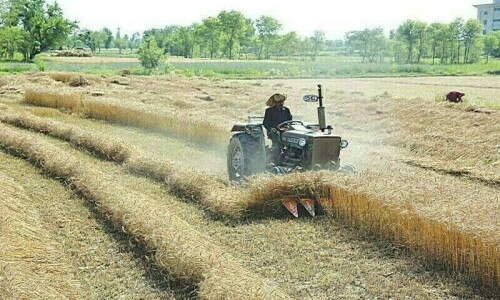BAHAWALNAGAR: Up to 15,000 barren acres, malnourished children, underfed animals and damaged houses tell the story of water logging and salinity along the Hakra Canal in Haroonabad and Fort Abbas tehsils.
The Hakra Canal with a capacity of 2,700 cusec originates from Jalwala headworks on the River Sutlej.
A visit along the canal shows that water logging and salinity have affected 150 villages by 50 to 60 per cent and 20 villages by 90 per cent.
Due to the spread of water logging, the wheat yield on partly water-logged land was reduced to five maund per acre this year from the average 45 maunds per acre. The villagers of affected area have demanded that the area be declared calamity hit.
The affected area is located a few kilometres from the no-man’s land on eastern Indian border.
The farmers of 156/3L, 157/3L, 195/HB, 196/HB, 194/7R and 160/7R have witnessed helplessly the onslaught of water logging and salinity on their farms in recent years.
The onslaught has gained an alarming momentum and has engulfed not only the agricultural land but also residential areas.
The situation has pushed the farmers of the affected areas on the verge of starvation as 90 per cent of the population of the affected areas depends solely on agriculture.
Water logging has destroyed valuable properties and mud houses stand ruined.
Farmers said so far 15,000 acres had been water-logged but water logging was engulfing the land every day and soon the fertile land of other villages would be under the water. They alleged the quarters concerned were apparently indifferent to the plight of the people.
Niaz Randhawa is one such farmer whose 20 acres have been eaten up by water logging and salinity.
Arshad Karim, of 195/HB, said that some water experts had informed them the twin menace surfaced here due to the construction of a water reservoir in Rajhastan in India, which is adjacent to the affected area.
Amin, of 157/3L, said they had been facing hostile living conditions in the areas because of mosquitoes and other insects, and children contracted disease due to unhygienic conditions.
Another farmer, Abdullah, said due to the paucity of fodder, their animals were dying.
Executive Engineer of Irrigation Development Division Sajid Razvi said his department was not asleep, and steps were underway to overcome the situation. The department is responsible for maintaining the drainage nullah.
Published in Dawn, May 6th, 2015
On a mobile phone? Get the Dawn Mobile App: Apple Store | Google Play












































Dear visitor, the comments section is undergoing an overhaul and will return soon.